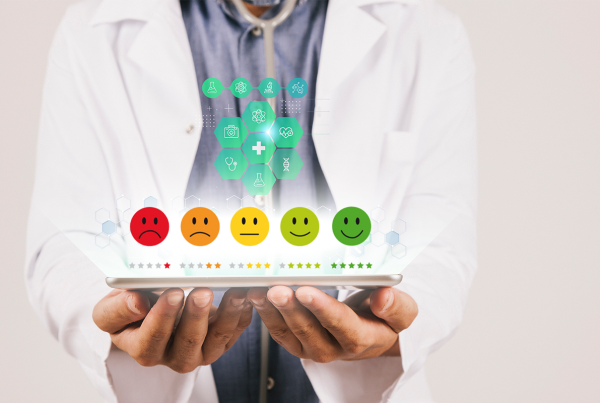Healthcare is a vital aspect of our lives, and the quality of our healthcare experiences profoundly affects our well-being and opportunities in life.
For years, patients, to take care of their health, have been paying a growing amount of their own medical bills. As a result, their’ expectations have increased and they are becoming more and more involved in the healthcare they receive. And therefore, today, patient satisfaction has become more crucial than ever, as unhappy patients would gladly switch to a different healthcare provider in search of better care and satisfaction.
To find out how your patients feel about their interactions with your medical services, you must ask them for feedback. It’s an excellent approach to gauge how successfully you and your medical team provide your patients with quality care and services, recognize any problems they might have during their medical care, and enhance their general quality of life.
In this article, we will discuss the value of patient feedback for healthcare providers, how to get it, and how to use patient surveys and patient feedback apps to gauge patient satisfaction, enhance patient experience, and eventually expand your business.
Patient Feedback, What is it?
Patient feedback is the term used to describe the perceptions, thoughts, and experiences that people who have received medical care have to provide. This feedback, which can take many different forms, including verbal communication, comments, or patient questionnaires, offers insightful details about the standard of care, relationships between staff members, and the general patient experience.
The main objective of taking Real-time patient feedback is to assist medical professionals in pinpointing areas for development and raising the standard of treatment they give. Putting in place a thorough patient engagement plan can make a big difference in terms of patient retention and enduring devotion to our medical practice.
Value of Patient Feedback and How it Improves Patient Experience
Patient feedback provides valuable insights into their experiences and emotions. Instead of letting patients leave dissatisfied, their feedback allows you to address and resolve issues, enhancing their overall experience. Moreover, the significance of patient feedback extends far beyond immediate improvements.
Here are some key reasons why it is crucial for healthcare providers.
Improves the Standards of Care
Patient feedback is an essential tool for promoting care quality improvement at your hospital or healthcare facility. You can find problems and worries your patients may have regarding the standard of treatment they receive when you get input from them on various elements of your healthcare facility at numerous touchpoints.
By recognizing these problems, you may take the appropriate steps to fix them and implement the much-needed changes to keep similar problems from happening again.
Improves Overall Patient Satisfaction
Patient feedback helps you measure patients’ satisfaction with your healthcare services. When you collect patients’ insights and utilize that feedback for patients to provide better medical care and treatment, it drastically improves patients’ overall experiences and raises their satisfaction levels, which also helps to improve patient outcomes.
You can gauge how satisfied patients are with your healthcare services by looking at patient feedback. Patients’ overall experiences and satisfaction levels are significantly improved, which also contributes to better patient outcomes, when patient insights are gathered and used for patients to receive better medical care and treatment.
Strengthening Patient Commitment
Requesting feedback from patients shows them that you value their thoughts and want to provide them with high-quality care. This raises patient engagement and presents a positive image of your healthcare business. According to the most recent studies from 2024, patients who are disengaged or less engaged are three times more likely to have unmet medical needs, which has a direct impact on patient loyalty. This is why good patient engagement is essential.
Patient loyalty increases when you act upon their input and begin providing better experiences for them. A positive patient experience encourages patients to always contact your medical facility and its physicians when they require medical attention or care.
Attracting Fresh Patients
In addition to selecting your healthcare brand over competitors, loyal patients also frequently tell others they know about it. Research indicates that around half of the patients depend on referrals from friends and relatives. Referrals from friends and family bring in new clients for your medical practice, which eventually helps it expand.
Establishing a Strong Industry Reputation
Unfavorable patient experiences frequently find their way into the business through word-of-mouth and unfavorable feedback ratings. Research indicates that over 70% of patients look for online reviews before making an appointment with a new physician. Thus, it is essential to make sure you have a positive reputation in the field, and patient feedback assists you in doing so.
Surveys are the most effective method for gathering patient feedback. However, there are additional compelling reasons to survey your patients. Let’s find them.
Importance of Patient Surveys in Healthcare
Utilizing surveys is a fantastic approach to connect with your patients and obtain the data you require to be able to treat and care for them more effectively.
Here are several key reasons why patient surveys are essential in the healthcare industry.
Provides Valuable Insights: Patients’ surveys offer important information about their health. Healthcare professionals can learn about patients’ dietary preferences, allergies, long-term medical conditions, and hereditary concerns by asking questions during the healthcare evaluation process. This data which has been gained using patient experience survey software aids in disease diagnosis and optimal treatment recommendation.
Tracks Patients’ Health Recovery: During the course of treatment, the patient survey can also be utilized to monitor the patient’s health and recovery. This aids in the doctors’ understanding of the patient’s body’s reaction to a particular treatment. They can choose the next course of medication and treatment with this information. Help Collect Patient Insights & Emotions: You can learn more about patients’ opinions on the care, treatment, and medical facilities they are offered at the hospital or clinic by conducting patient feedback surveys. This vital information, which has been gained through patient experience survey software, enables you to assess the degree to which your medical institution can treat and care for patients in a way that is both comfortable and fulfilling. Receiving feedback from patients aids in improving the standard of your medical care.
Enables Monitoring of Healthcare Staff Performance: Patients can track their experiences with doctors, nurses, receptionists, and other staff members through patient surveys, which are used to monitor the performance of medical personnel. These evaluations show which employees are performing well and which ones still require development and training.
Helps Detect Potential Patient Treatment Issues: Surveys of patient input are useful in identifying problems such as scheduling conflicts, lengthy wait times, unpleasant personnel, untimely medical results, and unclean conditions. To enhance patient happiness and the overall experience, you can act immediately on these issues.
Effective Ways to Gather Patient Feedback
There are various online and offline channels available to gather valuable patient feedback. By leveraging a mix of these methods, you can reach a diverse patient base and collect comprehensive feedback.
Here are some of the primary channels for capturing patient feedback:
Mobile & Tablet Surveys: Using effective patient feedback software, you can capture offline feedback from patients at your premises via Android and iOS devices such as tablets and smartphones. By approaching patients or their family members and asking them to share their feedback on the patient feedback app, you can hand them the device and collect their survey responses on the spot.
Kiosk Surveys: You can also install unattended kiosk devices at strategic locations within your hospital or clinic, such as the reception area, waiting rooms, pharmacy, and cafeteria, to gather patient feedback at various touchpoints. Patients or their family members can easily approach these kiosks, complete the survey, and submit their responses independently, without the need for supervision.
Website or App Surveys: If your patients use your official website or patient feedback app to book appointments and find information about doctors and their schedules, you can leverage these platforms to collect feedback. Incorporate feedback widgets such as popup surveys, slide-up surveys, and feedback buttons to gather patient feedback effectively.
Email Surveys: Email surveys are an effective method for requesting patient feedback. You can utilize various formats, such as:
- Embedded email surveys
- Hyperlink email surveys
- Signature email surveys
SMS Surveys: You can also use text messages to invite patients to complete surveys; the patients receive a text message with a link to the survey. It is simple for the patients to click on the link, complete the survey, and send in their answers.
Note: To know more on how one can gather patient feedback one can follow a Guide to Gathering Valuable Patient Feedback, which would help them to know more about the efficient ways to collect feedback.
Conclusion
Patient feedback is a powerful tool that can significantly enhance the quality of healthcare experiences and drive continuous improvement in healthcare services. It benefits both patients and healthcare providers by promoting patient-centered care, improving communication, and building trust.
By gathering feedback through various channels and offering specific and constructive input, patients can actively contribute to enhancing healthcare experiences.
As we move forward, patient feedback will remain a cornerstone of a patient-centric healthcare system, ensuring the delivery of the best possible care to individuals and communities.
Additionally, collecting and analyzing patient feedback using piHappiness survey software can help healthcare organizations boost patient satisfaction, improve service quality, and make data-driven decisions to provide better health services.
So, what are you waiting for? Schedule a free demo now with us and see how our patient feedback software can be a valuable resource for your healthcare industry. Contact piHappiness today for further information.








